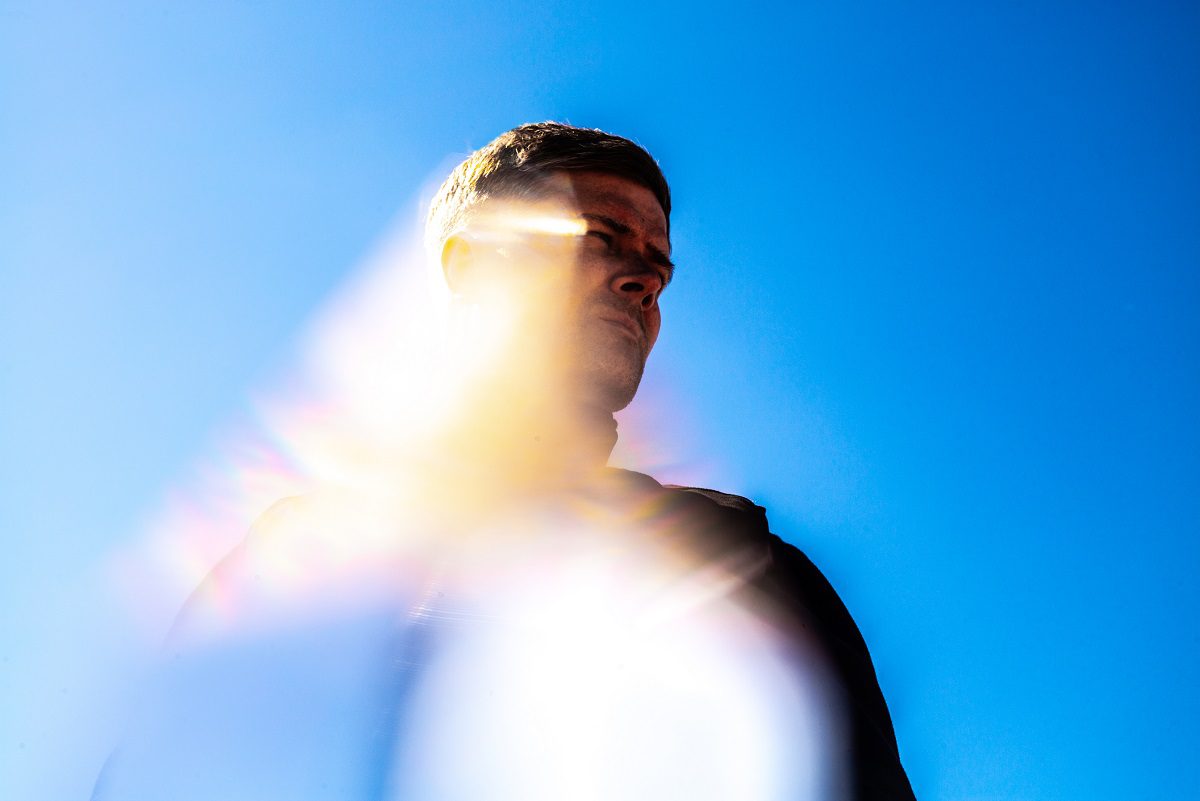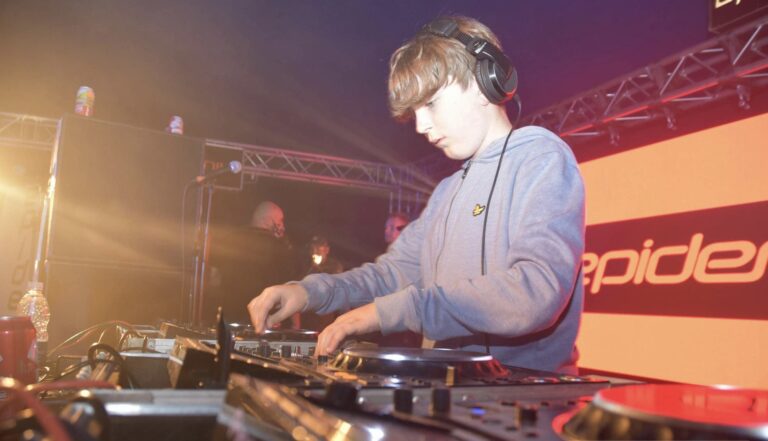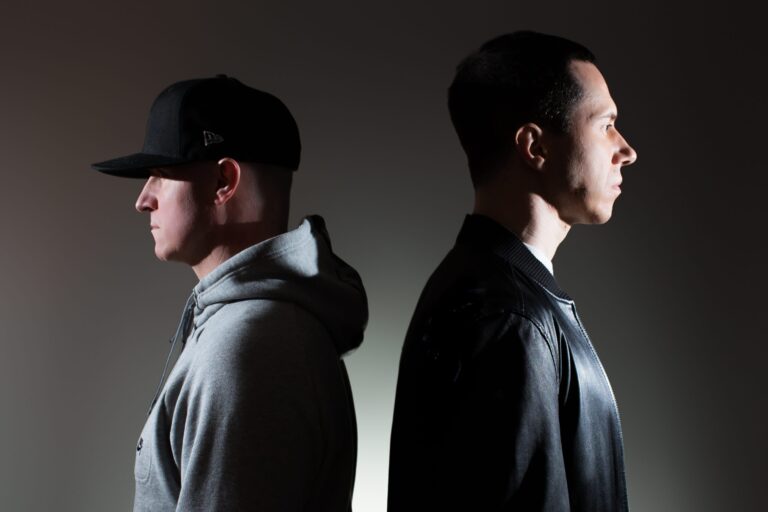Jack Workforce Stevens has been on a serious trip over the last two years…
Not literally. Over lockdown he couldn’t travel further than his studio.
Not colloquially, either. Although he would be open to a psilocybin trip under the right conditions.
No, Jack’s trip has been creative. And the results can be felt on his new album Set & Setting, a body of work that was created under some of the most intense self-imposed conditions and parameters possible. Rigorously going over and over and over it with a fine-tooth comb to create the most consistent, fluent yet dynamic and immersive drum & bass album he could make, Set & Setting is the zenith of Jack’s work so far post-SpectraSoul and has drove him to the point he may never write another album again.
The results justify the intensity; Set & Setting is a powerful listening experience that will stand the test of time as both a home listening experience and a set of tracks tailored for club damagement… Even though they were written during a time in our lives when we wondered if clubs would ever return.
It’s not only a unique album in that sense, but it’s unique in the sense that effectively it’s his solo debut LP, yet it’s also the fifth album he’s made. It’s also deeply, deeply personal. Amid the 12-track journey – which features collaborations with singers Madi Lane and Shady Novelle and local Brighton musical legend Leroy Horns – are samples and soundbites of other thoughts and perspectives from Jack’s mind. Clips from podcasts, documentaries and discussions that reveal his other interests… Ideas and theories surrounding quantum physics, the war on drugs and perceptions of reality. If there even is a reality at all.
The album is out but the trip continues. Literally, colloquially, creatively. Time to expand our minds…
It’s your fifth album but could you say this is your first true debut album?
It’s a tough one. I feel like Delay No More was the most honest album I’ve done. Creative juices going mental. That was the truest, no consideration for the market, ‘we’re doing this’ album.
Set & Setting is very true in its intentions for drum & bass, though. If there were no hurdles, it may have looked different. But I know how to pitch to a drum & bass market and, if you make an album that’s 50% D&B and 50% other stuff, it doesn’t land in the same way a D&B album does.
I spent a lot of time listening to old albums like Colours, Modus Operandi and Timeless and wanted to make something that was pure D&B, showcasing the breadth of the genre and my abilities within it. I didn’t want to cover the same space twice.
Yeah, turning your hand to every style within the D&B cannon was part of the challenge…
100% and I guess there’s more consideration to the artform of D&B. My challenge was to establish my sound as Workforce within the confines of an album. I like the limitations and challenges that gave me.
So this was the purest creative process that you have committed yourself through…
That’s definitely true. I asked myself questions like, ‘What breadth can I bring? What parameters can I fuck with here?’
It was an intense process wasn’t it?
It was very intense. This room is imposing. There’s no natural light in here. And, because of covid, there was no way to go out and let off steam or even be able to forecast what the world would be like post-covid. Would we even have dancefloors any more? Was this type of music even valid any more? These things were on my mind in here, when I drove back and forth to the studio, when I was at home on the weekends. It was full on.
And along the way SpectraSoul officially called it a day. The finality of SpectraSoul was an influence wasn’t it?
It was the precursor to me really working on it. I was working on the EP for 1985 and also the Critical EP but when we announced the split in October that was like, ‘Right! There’s a fire under my arse now let’s do this.’
That was a major part of this. Writing a D&B album was like me proving myself – I can do this on my own. It’s me trying to prove to the D&B community, the world and myself, that I can do it on my own.
It’s very personal in that sense. A very honest reflection of where you’re at, what you’re thinking about, what external sources were influencing you. Judging by the samples on the EP, and from what you’ve told me, you were having an existential crisis!
Yeah it was actually you who summarised the Photek quote I used on Broken: the idea that D&B is made out of what people bring in from the outside. So yes it was a very personal reflection of what I was consuming outside of the studio. The podcasts, the articles I was reading, it’s all part of the album sonically.
And leaving us scratching our heads with the notion that there is no reality! The message I got from one of them is that all of this is a result of my own reference points and the information my brain is giving to me.
It’s weird isn’t it? I’m a very rational person on some points but I’m also very whimsical and romantic about other things. You can’t go around grappling these subjects day-to-day or you’d go mad but I need to have my brain tickled by these thoughts and philosophies.
From What Sustains has that quote about reality and reanimation. The existential considerations are a big part of the personal side of the album. it’s personal in the way I could never be with SpectraSoul albums because Dave and I were very different in terms of what ideas we were bringing to the table.
What was the biggest mindblower you’ve had while listening to particular podcasts and your reading?
It wasn’t a big bang sense, but the gravitas of this blew my mind… How there’s research of psychedelics for people who are going through severe depression or have gone through traumatic experiences. There are studies with people going through guided psilocybin trips where you go in with intention and have to do a lot of reintegration.
Like the track title at the end of the album
That’s right. Reintegration is part of the process where you go through the trip and then you sit down with a counsellor and discuss the experiences and relate them to what you want to process. So you speak about the things you’d like to find resolution on before you do the trip. Then you speak to the counsellor afterwards.
There are other references in the track titles like Flight Instructions which are the instructions you have before the trip. Then there’s Observer, which is the idea you are the observer of the reality, creating the reality.
This is where my head starts to fall apart a bit…
Okay, so look up the double slit experiment. This is where they fire a particle of light through a piece of paper with two slits. When someone observes that happening, the light lands on a fixed point. But when it isn’t, it behaves like probability, like a wave.
So essentially our interaction with the world creates the reality between our brains. Otherwise it’s all probability. Light doesn’t have a fixed point until it’s observed by the eye. It’s like waves.
So like when a tree falls in the woods, does it make a sound?
Sort of. When a tree falls in the wood it creates probability of sound. It’s only a reality when it hits the apparatus in your ear. If there’s nothing to receive the fluctuations of air pressure it doesn’t get experienced as sound. It’s experienced as probability that’s only real when there’s something designed to receive that probability and make it a thing.
What about animals nesting in the tree?
The nesting birds would hear it, but it might be different from what we hear since they hear different frequencies to us. Essentially the absence of an observer, including feathered ones, means it’s just probability.
Ssssh now!
There are people who will debate it and there’s a certain amount of bias from me, because it makes sense to me, but sound is just fluctuations of airwaves. Even a mic is there to receive it. If we’re stood 50 meters away and we can’t hear it, but there’s a bird a mile away that does, then it’s an objective reality because a bird’s reality is different to ours.
When we swim in the sea, we can’t smell blood but a shark can. It’s a very different reality, it’s not objective. It’s all subjective and subject to influence by so many things.
Wow. So there I was thinking Reintegration was named as such because it follows some very freaky tracks. They’re like the sax solo of the album and then Leroy’s horns bring us back to a root note, all warm and dubby and reintegrated with a more typical idea of what drum & bass can be…
You can see the parallel there, then. That track does follow a challenging section of the album so there is resolution there. It is reintegration similar to that of the experience after a guided trip.
Okay. So are you interested in taking a trip yourself?
I’ve never taken psychedelics. I think my interest doesn’t come from a position of exploring different consciousnesses. I’ve always had very turbulent mental health. I’ve tried lots of different therapies, it’s a slow process and I’ve been dealing with stuff for as long as I’ve had a memory. I’ve had melancholy moments where I can’t express myself and they take hold of me where I get very depressed. So the idea of psilocybin trips having potential to be as good as 10 years of therapy is very interesting to me.
I’ve only really started thinking about this at this level and articulating myself when I moved back to Brighton. I couldn’t even consider this when I was in London. But I want to be a father, I don’t want to fuck things up like I have before and ruin relationships with partners, family and peers. I do want to do a guided trip. It’s very prescriptive. And obviously it’s illegal so it’s not the easiest thing to jump into.
I saw a documentary on it. A friend was one of the people who volunteered for the trial. It’s fascinating but seems very clinical for my own personal reference points with psilocybin and how I’ve felt benefits from that…
That documentary featured Robin Carhart-Harris. I’ve sampled him at the end of Observer – when he’s talking about set and setting. He ran the studies at the London Imperial college. The reason for the eye masks is to be inward and not have stimuli. I got fascinated by that actually. An author called Michael Pollan wrote a book called How To Change Your Mind. I remember being in airport listening to an interview with him and being like ‘wow’. You asked about mindblowers. This was one; massive bombs going off in my head. So that set me on this path.
This is fascinating and I love the openness about this side of drug culture. I wish you all the best of luck with your quest. Back to the music, how about the therapeutic process of creativity and how that helps your mental health.
Yeah there’s nothing more therapeutic when things are flowing and coming together. But this becomes counter productive when you’re overthinking things and overly scrutinising the work afterwards. Some of that serves a purpose – you need to give it care and attention. But there’s nothing that matches that feeling when things are falling into place.
Then you get bogged down in technicalities… Can that outweigh the positive benefits?
They go in hand in hand. I’m a big believer in peaks and troughs. You can’t experience true elation without depression. You can’t appreciate the highs or lows without each other. If this album goes well it’ll be worth it. And actually I’m proud of it anyway so the struggle is justified. It’s a weird trajectory – you have struggles when a tune won’t come together, but that makes the days when things do come together seem so much more enjoyable.
In D&B we’re one-man-bands. If you’re in an actual band then you can finish the song, record it and hand it over to an engineer. But in our world you can’t do that. You write it, you then have to engineer and mix it down and do all these other technical things.
But I do believe that when you’ve finished an album you should feel you’ve slogged your guts out and given it your all. And if you don’t feel like that, then you might not have gone to the lengths you maybe should have done.
Yeah I get that. But you went IN didn’t you? I think you scrutinised the album for weeks and weeks?
Yeah. That was the point I think went on a bit too long. I would come in and listen and listen and listen. I was trying to iron things out and bring the whole record together. Listening to points of difference between the tunes. I feel like albums require that much focus on the details and I felt a responsibility of doing that. But I’m also a glutton for punishment and maybe I took it too far. I guess it’s something the best people have a good handle on. like Alix Perez doesn’t get in his own way – he doesn’t ponder and over-think as much.
Was he one of the collective of peers you’d send music to for feedback?
He was. He was really helpful because he’s quite blunt. I cared the most about what he thought about the musical tracks. This was something I realised during the process, though; no one can truly care as much as you do as the creator. You have to trust your own ear and taste. I feel like reaching out for confidence often breeds the opposite response to what you want.
But every artist has those doubts though!
Yeah but you are in competition whether you like it or not. So if you’re not as confident as you’re making out you are, then when that album comes out people will know you had doubts about it.
Hmmm…. I was going to disagree for a second but yeah. If I want feedback on something I’m more likely to send my words to someone in the field who gets the discourse, but is not in direct competition. Like you, for example, rather than a writer contemporary of mine. I wouldn’t want them thinking ‘Ha! Dave’s got no confidence!’
See you get it. That’s it in a nutshell. I’m an open person. I don’t mind asking a stupid question and opening myself up to that. Maybe next time I would be more trusting and confident in myself. Although I have said I might never write another album
OH WHAT!?!
I know. It’s a lot, though man. Who knows what the future holds?
I get it. You’ve just done such a heavily personal body of work. The fact you open it with your partner Madi singing on it is special too isn’t it?
The most special thing. I wanted Madi on there for that reason. She’s a teacher so we did in the easter holidays and it was one of the final pieces of the album. That and Leroy’s horns for Reintegration were he final bits. They felt very cathartic and felt like closure.
All of Leroy’s horns were the last bits?
No. He did the harder tunes first. But, as it was coming together, I wanted something that was a proper collaboration. So with the other elements of his, he was working around my tunes. But with Reintegration he recorded the horns and I wrote the tune around that. I actually carried on writing after that but I realised I had the 12 I needed for the album so I cut them. And that was actually the hardest thing to do. So if I did do another album, I’d definitely do things differently because I’ve learnt so much.
You don’t regret any decisions you made…
No and you’re always sharpening the tools and refining the efficiency of getting from A to B. I’ll probably have forgotten about all of this if I do another album. And if I do, it’ll be a different mind set in a different setting. So it’ll sound different and feel different by virtue of those elements changing.
Totally. So to bring it back full circle. This isn’t the truest debut but it’s the most honest and rigorous process you’ve put yourself through.
Yeah Late Night Soundtrack started as the seeds of this album but it was very club focused but it helped me understand the palette I wanted to draw from and the picture I wanted to paint. It’s the most pure and honest me album because it’s the first I’ve done in this way. It’s weird being able to do that, even though I’ve had the experience of making albums before. I took everything I learnt from the previous ones and they still didn’t prepare me for the process of how hard this would be.
The final piece of the puzzle is when it’s finally out in the world. Is there are sense of closure?
I already feel a bit of that in the lead up of releasing singles. But as soon as it’s out I know I’ll be like, ‘What’s next, then?’ I’ve never rested on my laurels so I’ll be reaching a new challenge. Who knows what it will be…


